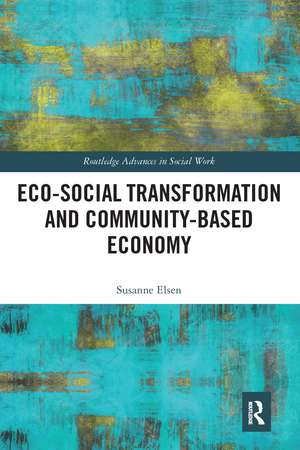Eco-Social Transformation and Community-Based Economy: Routledge Advances in Social Work
Autor Susanne Elsenen Limba Engleză Paperback – 30 iun 2020
Eco-Social Transformation and Community-Based Economy provides a transdisciplinary conception of community based socially productive approaches to eco-social transformation and sustainability. It introduces interdisciplinary discourses, basic theoretical concepts, participatory and community-based research, development strategies and practical prospects and considers them in the context of both eco-social transformation and eco-social work, especially with disadvantaged groups.
With case studies that demonstrate the creative power of local embeddedness, diversity and cooperation, this book presents integrative local approaches as convincing examples of possible ways forward. It will be of interest to all scholars, students and activists working in community development, social development, social work and human geography.
Din seria Routledge Advances in Social Work
- 5%
 Preț: 286.86 lei
Preț: 286.86 lei - 5%
 Preț: 288.70 lei
Preț: 288.70 lei -
 Preț: 326.49 lei
Preț: 326.49 lei -
 Preț: 301.64 lei
Preț: 301.64 lei - 5%
 Preț: 1012.32 lei
Preț: 1012.32 lei -
 Preț: 309.55 lei
Preț: 309.55 lei -
 Preț: 303.60 lei
Preț: 303.60 lei -
 Preț: 282.41 lei
Preț: 282.41 lei -
 Preț: 304.68 lei
Preț: 304.68 lei -
 Preț: 301.58 lei
Preț: 301.58 lei -
 Preț: 309.99 lei
Preț: 309.99 lei -
 Preț: 284.10 lei
Preț: 284.10 lei - 5%
 Preț: 221.74 lei
Preț: 221.74 lei - 9%
 Preț: 867.57 lei
Preț: 867.57 lei -
 Preț: 405.52 lei
Preț: 405.52 lei - 5%
 Preț: 329.36 lei
Preț: 329.36 lei -
 Preț: 383.24 lei
Preț: 383.24 lei -
 Preț: 402.66 lei
Preț: 402.66 lei - 12%
 Preț: 331.87 lei
Preț: 331.87 lei - 18%
 Preț: 1002.99 lei
Preț: 1002.99 lei -
 Preț: 375.18 lei
Preț: 375.18 lei -
 Preț: 399.79 lei
Preț: 399.79 lei -
 Preț: 367.28 lei
Preț: 367.28 lei -
 Preț: 404.58 lei
Preț: 404.58 lei - 28%
 Preț: 820.32 lei
Preț: 820.32 lei - 18%
 Preț: 1000.27 lei
Preț: 1000.27 lei - 18%
 Preț: 1110.77 lei
Preț: 1110.77 lei - 5%
 Preț: 412.72 lei
Preț: 412.72 lei - 18%
 Preț: 999.51 lei
Preț: 999.51 lei - 17%
 Preț: 251.58 lei
Preț: 251.58 lei -
 Preț: 363.80 lei
Preț: 363.80 lei -
 Preț: 443.11 lei
Preț: 443.11 lei -
 Preț: 495.67 lei
Preț: 495.67 lei - 18%
 Preț: 1000.27 lei
Preț: 1000.27 lei -
 Preț: 476.64 lei
Preț: 476.64 lei -
 Preț: 381.72 lei
Preț: 381.72 lei -
 Preț: 372.08 lei
Preț: 372.08 lei
Preț: 412.63 lei
Nou
Puncte Express: 619
Preț estimativ în valută:
78.95€ • 82.44$ • 65.35£
78.95€ • 82.44$ • 65.35£
Carte tipărită la comandă
Livrare economică 05-19 aprilie
Preluare comenzi: 021 569.72.76
Specificații
ISBN-13: 9780367582555
ISBN-10: 0367582554
Pagini: 132
Dimensiuni: 156 x 234 x 5 mm
Greutate: 0.22 kg
Ediția:1
Editura: Taylor & Francis
Colecția Routledge
Seria Routledge Advances in Social Work
Locul publicării:Oxford, United Kingdom
ISBN-10: 0367582554
Pagini: 132
Dimensiuni: 156 x 234 x 5 mm
Greutate: 0.22 kg
Ediția:1
Editura: Taylor & Francis
Colecția Routledge
Seria Routledge Advances in Social Work
Locul publicării:Oxford, United Kingdom
Public țintă
PostgraduateCuprins
Acknowledgements; Chapter 1: Why is community economy a central task of eco-social transformation?; Eco-social challenges and community-based economy; The new limits of growth; The necessity of a new great transformation; Prosperity or Growth?; Human needs and aspirations; A new social contract; Demographic change and post growth society; Work and productivity in a post growth society; Chapter 2: What is Community-Based Economy?; Differences matter; Reproduction and eco-social transformation; Embedded Economy – Polanyi’s legacy; Diversity matters; Hybridity and Civil-Society; Ownership, Commons and Communing: Ostrom’s legacy; Social capital and economic transaction for resilient communities; The economy of the whole house – a heterodox perspective; Chapter 3: Social and Solidarity Economy; A retrospection; What is Social and Solidarity Economy (SSE)?; Fields, purposes and effects of Social and Solidarity Economy; Third sector organizations and their potential for social innovation; New institutional arrangements and de-commodification; The potential of cooperatives; The Italian Version; Social Agriculture; Urban Agriculture; Community supported Agriculture (CSA); Solidarity Purchase Groups in Italy (GAS); Cooperative energy supply; Alternative and complementary currency; Time-based exchange systems; Repairing, Re-using, Recycling: Community workshops and repair cafés against planned obsolescence; Prospect; Chapter 4: How can Community-Based Economy be (re)built?; Re-localization, pluralization and economic subsidiarity; Community Development and social innovation; Transformative research as means of community development; Community-based participative planning and development – a retrospect and future perspective; New approaches in rural restoration; Reclaiming and managing the commons; Unconditional basic income; Reframing and re-embedding socio-economic transaction; Chapter 5: Case Studies: Their background and societal impact; Libera Terra – Social Cooperatives combatting the Power of Mafia Organizations in Italy; Riace – a small South-Italian village as a model for Europe; A multi-stakeholder network counteracting new slavery in Italian agriculture; Cosmopolitan Hospitality: Grand Hotel Cosmopolis; The sixth Continent: The House of Solidarity; Social Agriculture in Italian Prisons; Organizing citizen interests in a community cooperative; Revitalizing a village by hosting elderly people; A network to foster local alternatives: Social Economy Basel; Conclusions; Index
Notă biografică
Susanne Elsen is professor for social sciences at the free University of Bolzano, Italy. She has long-term experience in transformative research, development and training in fields of social and solidarity economy and community-based development in- and outside of Europe.
Her emphasis as researcher and activist lies in eco-social development and transformation with a special focus on integrative and participative socio-economic solutions for disadvantaged rural and urban areas.
Her emphasis as researcher and activist lies in eco-social development and transformation with a special focus on integrative and participative socio-economic solutions for disadvantaged rural and urban areas.
Descriere
Eco-Social Transformation and Community-Based Economy provides a transdisciplinary conception of community based socially productive approaches to eco-social transformation and sustainability.
